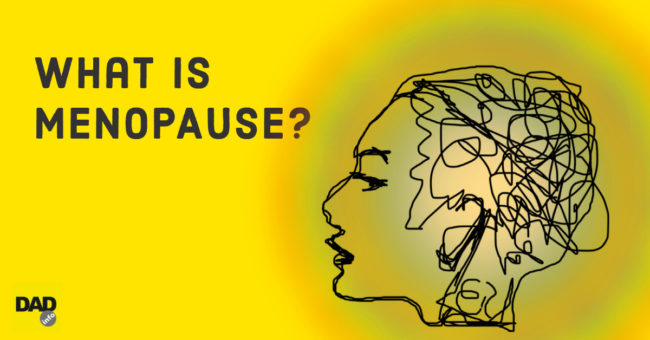
I want to talk about a secret… menopause!
It impacts women both physically and mentally.
It’s often not spoken about.
Women feel they are just left to get on with it.
But, if a woman you love is going through her menopause, you can (and really should) be prepared to help.
What is Menopause?

Most blokes don’t really know much beyond the fact that women stop having a period sometime in early middle age. Ian Soars, CEO at Dad Info is forced to admit that the extent of his understanding of menopause was ‘unspecific symptoms like hot flushes and knowing glances between women. It seemed taboo and women seemed to close ranks around it…and so I guess I thought that I just wasn’t supposed to know.’
Julia, a counsellor at Spurgeons agreed to share her experience of menopause:
“ I did several pregnancy tests, and found I wasn’t pregnant, but no periods. Then I started looking into the perimenopause, and the menopause. Infrequent periods, followed by hot flushes in the day, that came on so suddenly, and would distract me whilst driving or at work. Night sweats, that had me tossing & turning, unable to sleep at times, making me tired, irritable and unable to concentrate during the day. Mood swings at varying times and learning how to cope with it all. Coming to terms with the end of being able to conceive! A loss of a part of myself, a sign of getting older. It did make me feel anxious at times, constantly drained and I felt low wondering how I would cope. I slowly learnt to accept it, and to just let my body do what it must do. To trust my body, and let it get on with it!
Julia
What are the physical symptoms of menopause?

Ian, CEO of Dad Info, has struggled to know how to support female colleagues wrestling with ‘the change’.
‘The reality of the menopause for women I know well or work with has been quite shocking. Months of migraines, total sleeplessness and profound physical side effects have all seem fairly common. The staggering thing is that the women just kept working, didn’t say too much and got the job done. I simply wouldn’t have been able to cope.’
Ian
Every woman’s experience will be different.
In the UK the average age for menopause is 51, but signs and symptoms can start from 45 or earlier. This phase is called the perimenopause.
Physical symptoms include irregular periods, hot flushes, sleeplessness, weight gain, hair loss, night sweats, gum problems, vaginal dryness, change in libido, and osteoporosis.
Menopause impacts every system of the body.
How does menopause impact a woman’s mental health?

A feeling of loss
After all, menopause is an end, the end of a woman’s ability to have more children (even if this wasn’t on her agenda previously). Menopause can mark a time of loss of youth, loss of attention and being noticed, loss of health (particularly if you have significant menopausal symptoms).
A lack of control
Women can’t control what symptoms they might experience, or when menopause will happen. In addition, it is a period associated with change: children leaving home, parents requiring more time/ attention due to health problems, or even death of parents.
A feeling of insecurity
As women approach the menopause their hormone levels are changing. A blood test will reveal that oestrogen levels are lower. Hormonal changes have a huge impact on memory, concentration and mood. These factors can negatively affect daily activities and create additional pressure and stress at work and at home.
Linda also agreed to share her experience and recalls:
‘I was conscious that my work was seeming much harder, and I put this down to stress. I also felt very insecure, felt like my colleagues were judging me.’
Linda
Linda’s periods had stopped a year earlier and she had thought that the menopause was therefore over. However, menopause is a longer process (lasting from 12 months to 5 years) and without diagnosis the stress was impacting her work. Fortunately at a routine medical appointment a practice nurse advised her to have a blood test which showed her oestrogen levels were low.
During menopause it is completely normal for any woman to experience anxiety, panic attacks, depression and irritability among other symptoms.
Everything a woman is experiencing during menopause is normal and our job is to give them space when they need it, listen when they want and work to minimise any other stress they might be feeling as stress can make symptoms worse.
Linda found relief from her symptoms and avoided medication by losing weight and renewing her love of walking.
‘It’s only when I look back I can see how difficult life had become and how much energy I was using just to get through the day.’
linda
Julia can see the upsides now:
‘I have less periods now, a bonus, and I sometimes get a bit hot at night, but everything else for the moment has settled down.’
julia
If you have read this far and are supporting someone going through a similar journey, here are some general tips for men supporting women through menopause:
- Listen, and be forgiving. Menopause is a time of change for everyone, so take time and learn what you can do to help
- Encourage them to make an appointment with their GP for blood tests and to talk about supplements and options for medication
- Make time for them to talk with their female friends and family in the same situation
- Discuss ways you can support them getting regular sleep
- Cook healthy, tasty food and encourage regular meals
- Discuss exercising together, as gentle regular exercise (even if it is just walking) can help
- Suggest cutting out caffeine and red wine. But do it together!
About the authors
Huge thanks to the Counselling team at Spurgeons for sharing their professional advice and personal stories.
Further Reading
Try Maisie Hill’s – Perimenopause Power









